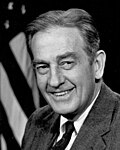November 7, 1972 | |||||||||||||||||
| |||||||||||||||||
 County results Case: 50–60% 60–70% 70–80% | |||||||||||||||||
| |||||||||||||||||
| Elections in New Jersey |
|---|
 |
The 1972 United States Senate election in New Jersey was held on November 7, 1972. Incumbent Republican Clifford P. Case defeated Democratic nominee Paul J. Krebs with 62.46% of the vote.
Contents
- Republican primary
- Candidates
- Results
- Democratic primary
- Candidates 2
- Campaign
- Results 2
- General election
- Candidates 3
- Campaign 2
- Results 3
- Notes
- References
Primary elections were held on June 6. [1] Case turned away a challenge from conservative doctor James Ralph. [2] Krebs won a large plurality in the Democratic primary over Daniel Gaby and Joseph Karcher.
As of 2026, this was the last time the Republicans won a U.S. Senate election in New Jersey, [a] the second longest such drought for Republicans in any state after Hawaii (since 1970).
Case outperformed Richard Nixon's vote share in the concurrent presidential election by 0.89%.

